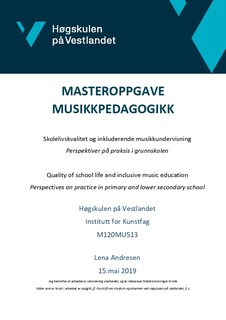| dc.description.abstract | This is a master thesis in music education at the University College of Western Norway. Through this research project I have elucidated how pupils, music teachers and school management experience inclusive music education in primary and lower secondary school. The study is based on and is rooted in the theoretical concept of skolelivskvalitet (life quality at school), defined by Tangen (2012). The term is sensitizing and has the purpose of elucidating subjective experiences both pupils, school leaders and music educators have, related to music education in primary school.
Here answers are sought for how students, music educators and school management experience different aspects of inclusive music education, as well as which didactic choices that characterize the experiences. The main research question is: How can the principles of quality of school life be safeguarded through inclusive music education in primary school?
Through music pedagogical theory, Nielsen (2010) has defined didactic forms of activity that denote content elements in music education. Findings affect several of the activity forms, but it is the music activities with variation that dominates. The production side is the form of activity that stimulates the pupils' opportunity for curiosity and creative activity in musical activities within clear limits.
The research findings indicate how inclusion is a central theme in schools, but also an area that is considered challenging. The challenges unfold in relation to lack of resources, communication between music educators and assistants, as well as enough expertise to adapt the music teaching to pupils with special needs. Findings have also shown that pupils are not fully aware of what inclusion really entails, and some pupils show difficulty in putting inclusion into practice.
Variation in work tasks seems to contribute to experience of good school life quality in inclusive music education. The working methods the pupils refer to are various music stations and work on creative projects such as musicals, concerts and suchlike. The relationship with the music educator and other adults seem to be crucial to good school life quality.
The pupils need challenges and feelings of accomplishment. In light of the concept of school life quality, they enjoy being challenged with music assignments. Challenging tasks related to music activities seem to give pupils extra enjoyment, described by the pupils themselves as fun. | nb_NO |

